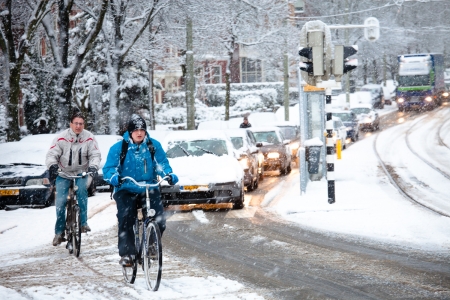Most weather research has been done on the effect of rain and specifically on the safety of motor vehicle occupants. An analysis of studies from several European countries over 1991-2016 [4] shows that all studies report a higher crash rate for driving/riding in the rain, than for driving/riding in similar situations without rain. This is in terms of the number of crashes per vehicle or per kilometre travelled. A more recent Finnish study [5] confirms an increased risk for driving in the rain, but the increase is relatively small (see the question Which weather conditions are most common when crashes occur and how dangerous are they?). There are far fewer studies that have looked at other road users such as pedestrians and cyclists, and the results do not allow an unequivocal conclusion on the effect of rain on their safety [4].
Reasons why rain increases risk for motor vehicles include longer braking distances, reduced tyre grip (aquaplaning) and reduced visibility due to rain and splashing water on the windscreen. This applies to a lesser extent to roads with very porous asphalt (see the question What measures can reduce negative weather effects on road safety?).Moreover, a first light rain shower after a longer dry period often causes slipperiness as road debris such as oil, rubber or dust mixes with the water drops.
On rural roads and motorways, there are more crashes and casualties during rain than when it is dry [4]. Thus, any mobility effects (see the question How does the weather affect road safety?)) or behavioural adjustments (see the question Do road users adapt their driving behaviour to weather conditions?), at least on these roads, do not sufficiently compensate for the increased risk. Studies that have looked at all road types collectively or only at urban roads show a more mixed picture [4]. This may be because rain reduces the mobility of vulnerable road users, who are mostly out and about in urban areas.
